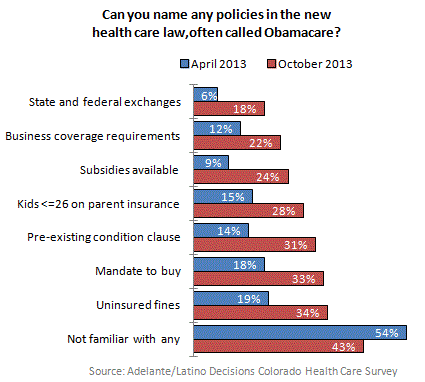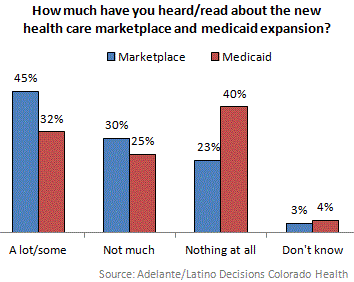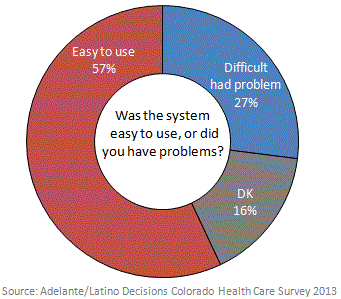A new poll of Latino/Hispanic adults in Colorado provides evidence that targeted outreach strategies in the state have increased awareness about the Affordable Care Act (ACA). The poll, commissioned by Adelante con la Salud: Latino Health Care Engagement Project (Adelante) and administered by Latino Decisions, queried 300 Latino/Hispanic adults living in Colorado regarding their knowledge of the new health care law, exposure to outreach efforts, response to participation appeals, and actual experience with ACA enrollment. The results from this study can be compared to an earlier poll conducted in April with comparable measures across on several indicators related to knowledge and familiarity with the ACA.
Effective Outreach
Adelante’s Latino outreach strategies were informed by data collected in the April 2013 survey of Colorado Latinos. Results from that study provided insight on appropriate terminology, messaging, messengers, and information platforms to maximize the impact of their outreach programs. The interventions Adelante employed in Colorado incorporated the information gleaned from the April study, and proved successful at increasing knowledge about the ACA within the targeted population.
By October 2013, 77% of Latinos in Colorado had heard an announcement or advertisement about ACA through radio, television, online news, or social media in the prior six months. An additional 25% had heard about the ACA at a community center, health clinic, school or church over the same period. It is clear that information about the Affordable Care Act was more readily available to Latinos in Colorado in the six months leading up to the ACA launch.

A dominant finding in the April survey was the lack of basic knowledge about the new health care law. For example, when asked to about different provisions in the law, the majority of Latinos in Colorado (54%) indicated that they were not familiar with any at all. The most commonly referenced ACA policy provisions were required fines for the uninsured (19%) and the mandate to purchase insurance (18%). By October, there is significantly more information about the various components of the law. The share of Latino adults who know that adult children can remain on their parent’s insurance plan increased by thirteen points (15% in April, 28% in October). Awareness of the state healthcare marketplace tripled from 6% to 18% during this short period of time. It is also notable that the share of respondents who knew that pre-existing conditions no longer exclude people from coverage doubled (14% in April, now up to 31%).
In addition to the actual content of the new health care law, the October survey also asked respondents about their exposure to information specific to the healthcare marketplace that opened just before the survey went into the field. Nearly half, 45%, had heard or read either a “great deal” or “some” about the healthcare marketplace in Colorado. This was greater than the 32% share that reported hearing “a great deal” or “some” about Medicaid expansion in the same October poll.

Respondents were asked whether they had attempted to get information about the healthcare marketplace online or by phone. The Colorado healthcare marketplace opened October 1st, so respondents would have had over two weeks to attempt to enroll at the time they were participating in this study. The state is operating its own insurance exchange, which could provide an interesting counterpoint to the much maligned federal ACA website. Only 15% of our sample had engaged with the healthcare marketplace in Colorado. A mere 4% tried to enroll via the website or telephone. While that number is low, it is also consistent with the fact that 61% of Colorado Latinos do not plan to enroll in the new health care program because they plan to maintain their existing coverage. At the time the survey was in the field, the deadline for uninsured to enroll in a plan was two months away (and further extended at this point), so it is possible that the sense of urgency to enroll was not particularly strong.

The dominant discussion on the health care law has centered upon technical difficulties associated with healthcare.gov, criticism of President Obama, and HHS Secretary Sebelius. While not free from complications, results from this survey support reports noting that Colorado’s healthcare market has been running smoothly. Among those who had attempted to get information or enroll, 57% reported that the system was easy to understand compared to 27% who experienced problems.
The unique research design commissioned by Adelante con la Salud: Latino Health Care Engagement Project and administered by Latino Decisions provided the opportunity to assess the impact of Latino focused outreach efforts on knowledge of the Affordable Care Act in Colorado. Significant increases in awareness about the health care law and engaging with the information through various formats points to the success of their efforts and can serve as a model for others working to implement the ACA effectively across diverse populations.
Survey Methodology
Latino Decisions interviewed 300 Latino adults across the state of Colorado between October 14-18, 2013 from a list of randomly selected Hispanic households. The study carries a margin of error of +/- 5.6%. Interviews were conducted in English or Spanish, at the discretion of the respondent. Respondents in both landline and cell-phone only households were interviewed by telephone, and respondents were also recruited from an online web panel of Latino adults in Colorado. Overall, the final data were weighted to match the most recent U.S. Census American Community Survey estimates for the Latino population in Colorado, and can be interpreted as reflective of the statewide Latino population. The survey is posted here.
Gabriel R. Sanchez is an Associate Professor of Political Science at the University of New Mexico, Interim Director of the RWJF Center for Health Policy at UNM and Research Director for Latino Decisions. Kenia Morales is the Adelante con la Salud: Latino Healthcare Engagement Project Program Manager


